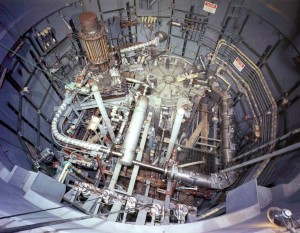 Today there are 100 nuclear plants operating in the United States, providing roughly 17% of our electricity. They do so with water technology developed in the 1960’s and 1970’s and many of these plants are extending their licenses from 40 to 60 years after careful regulatory review. Even new design nuclear plants such as Westinghouse’s AP-1000 and General Electric’s ESBWR are fundamentally the same technology, which are described as evolutionary. Yet today there are many new innovative designs and technologies that are being developed that are not water based.
Today there are 100 nuclear plants operating in the United States, providing roughly 17% of our electricity. They do so with water technology developed in the 1960’s and 1970’s and many of these plants are extending their licenses from 40 to 60 years after careful regulatory review. Even new design nuclear plants such as Westinghouse’s AP-1000 and General Electric’s ESBWR are fundamentally the same technology, which are described as evolutionary. Yet today there are many new innovative designs and technologies that are being developed that are not water based.
These innovators face enormous challenges in coming up with new designs utilizing coolants such as helium, molten salts, liquid metals and heat pipes. They’re also dealing with a regulator, the Nuclear Regulatory Commission (NRC), which has great expertise in dealing with water cooled reactors but limited, if any, knowledge of other reactors using different coolants and designs. To make matters worse, NRC regulations are totally water based, making it even harder to comply with regulations that are not applicable to more advanced and arguably safer designs.
To solve this problem, the regulatory process must be changed to allow for innovation to bring forward improved and safer nuclear power plants. These new plants would be more suitable to siting nearer to population centers for distributed power generation and for developing nations. Such changes as:
• Technology neutral safety criteria
• A phased licensing approach allowing for developers more certainty in the licensing process and for confidence of investors
• Realistic risk informed design criteria that would give credit for fundamental safety features in the designs.
We need to move to the next generation of nuclear technology but we cannot do it with a regulatory process that is inflexible and outdated.
How should regulators approach new nuclear technologies? How could we improve the licensing process for advanced reactors?
These are timely and on-target observations by Kadak. Innovation in nuclear energy is moving ahead in other countries while it is being retarded in the US. The NRC, as Kadak… Read more »
Another fundamental problem with nuclear is that the public has an irrational fear of nuclear power. I believe a nuclear plant is 1000 times safer than a coal plant using… Read more »
My hope is that commenters may suggest additional changes in the licensing process for example, instead of having adjudicatory hearings that drag on forever, why not adopt the administrative process… Read more »
Does anyone have a comment on using administrative versus adjudicatory hearings in the licensing process for nuclear plants like EPA does for other environmental issues?
I believe the best way to proceed on evaluating whether to proceed with new nuclear power plants in the United States is to establish a major pilot project with standardized… Read more »
You make some very good points which are consistent with the remarks I made to the DOE’s Nuclear Energy Advisory Committee looking at future directions for their program. Get smart… Read more »
Advances in nuclear technologies means that the regulatory regimes need to be changed to become more realistic in regards to safety, lower O&M, significantly less water, and much more transparent… Read more »
While this comment is not focused on the question posed, it raises some issues which continue to misunderstood. The writer is correct about cost overruns and schedule extensions but that… Read more »
Thanks to a number of factors – natural disasters, the steady flow of increasingly clear and detailed data, and significant new political accords such as the US-China climate consensus from… Read more »
Before discussing strategies for energy innovation, it is important to get the context correct. Daniel, your assertions about a growing climate change consensus above are incorrect. What is growing about… Read more »
Just a response to the traditional and some would say “tired” litany of complaints about nuclear energy cited by Robock. The facts are fairly clear. The US nuclear power plants… Read more »
I would offer only a couple of reactions to some of the comments already made. First, with regard to Professor Kammen’s discussion that Peak [insert favorite fossil here] is largely… Read more »
As the moderator of this discussion, I only offer a couple of additional comments on SMRs. They do offer the potential for a more affordable option for many utilities that… Read more »
The specific questions posed above by Dr. Kadak are about regulators and licensing. What I believe is coming is a new proliferation of nuclear chemistries and fuel cycles that will… Read more »
Some futuristic conclusions based on the discussions posted above; and on the present energy environment. There cannot be a water reactor nuclear plant build out in the USA that is… Read more »
[…] have all but eliminated long-term investment in industrial research. For the nuclear industry, an outdated regulatory framework only exacerbates the problem, lengthening time to market and requiring even […]